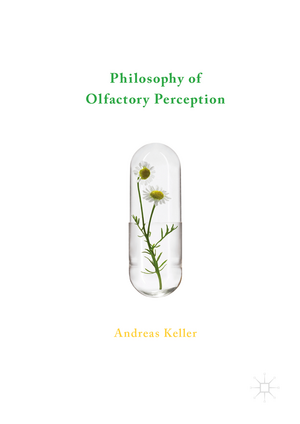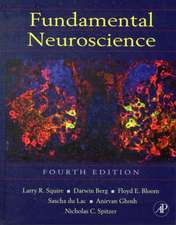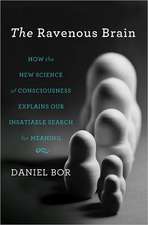Philosophy of Olfactory Perception
Autor Andreas Kelleren Limba Engleză Hardback – 13 ian 2017
The first part of the book considers perception with respect to its ability to guide behaviors and to make information available to cognitive processes. The author continues by addressing the differences between conscious and non-conscious olfactory perception, and presents an argument for an important role of attention in conscious processes. The book concludes by discussing the function of conscious brain processes and their link to guiding behaviors in complex situations.
| Toate formatele și edițiile | Preț | Express |
|---|---|---|
| Paperback (1) | 721.33 lei 6-8 săpt. | |
| Springer International Publishing – 14 iul 2018 | 721.33 lei 6-8 săpt. | |
| Hardback (1) | 729.53 lei 6-8 săpt. | |
| Springer International Publishing – 13 ian 2017 | 729.53 lei 6-8 săpt. |
Preț: 729.53 lei
Preț vechi: 889.68 lei
-18% Nou
Puncte Express: 1094
Preț estimativ în valută:
139.62€ • 145.38$ • 117.99£
139.62€ • 145.38$ • 117.99£
Carte tipărită la comandă
Livrare economică 10-24 martie
Preluare comenzi: 021 569.72.76
Specificații
ISBN-13: 9783319336442
ISBN-10: 3319336444
Pagini: 182
Ilustrații: XVI, 199 p. 15 illus.
Dimensiuni: 148 x 210 x 19 mm
Greutate: 0.5 kg
Ediția:1st ed. 2016
Editura: Springer International Publishing
Colecția Palgrave Macmillan
Locul publicării:Cham, Switzerland
ISBN-10: 3319336444
Pagini: 182
Ilustrații: XVI, 199 p. 15 illus.
Dimensiuni: 148 x 210 x 19 mm
Greutate: 0.5 kg
Ediția:1st ed. 2016
Editura: Springer International Publishing
Colecția Palgrave Macmillan
Locul publicării:Cham, Switzerland
Cuprins
Introduction: Why study philosophy of olfactory perception?.- PART I: PERCEPTUAL QUALITIES.- Chapter 1: Perceptual quality space.- Chapter 2: Third-person access to perceptual qualities.- PART II: PERCEPTS.- Chapter 3: Olfactory objects.- Chapter 4: The function of perception.- PART III: OLFACTION AND COGNITIVE PROCESSES.- Chapter 5: Availability of olfactory information for cognitive processes.- Chapter 6: Modulation of olfactory perception.- PART IV: CONSCIOUSNESS.- Chapter 7: Mechanisms of consciousness.- Chapter 8: Function of conscious brain activities.- Conclusion: Comparing olfaction and vision.- Acknowledgments.- Illustration credits.- References.
Recenzii
“There is much to admire in Keller’s book. It is a clear and engaging presentation of much recent research on olfaction and could help to bring the interest and puzzles of olfaction to a wider audience. … it does a very good job even if there is, as one would suspect, still more to do.” (Barry C. Smith, Chemical Senses, Vol. 42, September, 2017)
Notă biografică
Andreas Keller obtained a PhD in Neuroscience from the University of Würzburg, Germany, in 2002, and a PhD in Philosophy from the City University of New York, US, in 2015. Since 2003 he has worked at the Rockefeller University in New York City, studying human odor perception in the laboratory of Neurogenetics and Behaviors. He has published more than 20 papers on olfaction in such academic journals as Science and Nature. He has given over 20 talks on the topic across four continents, including presenting a workshop on "Olfactory Consciousness" at the Annual Meeting of the Association for the Scientific Study of Consciousness in Brisbane, Australia, in 2014.
Textul de pe ultima copertă
This book reconsiders the major current topics in the philosophy of perception using olfaction as the paradigm sense. The author reveals how many of the most basic concepts of philosophy of perception are based on peculiarities of visual perception not found in other modalities, and addresses how different the philosophy of perception would be if based on olfaction. The book addresses several aspects of olfaction, including perceptual qualities, percepts, olfaction and cognitive processes, and consciousness.
The first part of the book considers perception with respect to its ability to guide behaviors and to make information available to cognitive processes. The author continues by addressing the differences between conscious and non-conscious olfactory perception, and presents an argument for an important role of attention in conscious processes. The book concludes by discussing the function of conscious brain processes and their link to guiding behaviors in complex situations.
The first part of the book considers perception with respect to its ability to guide behaviors and to make information available to cognitive processes. The author continues by addressing the differences between conscious and non-conscious olfactory perception, and presents an argument for an important role of attention in conscious processes. The book concludes by discussing the function of conscious brain processes and their link to guiding behaviors in complex situations.
Caracteristici
Considers olfactory rather than visuo-centric insight into perception philosophy Offers insight from an expert in both the neuroscience of olfaction and the philosophy of perception Includes a range of informative illustrations












